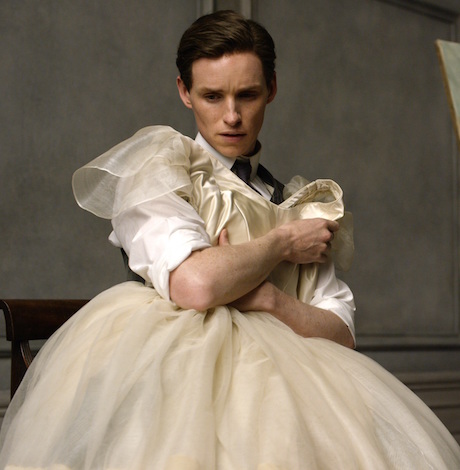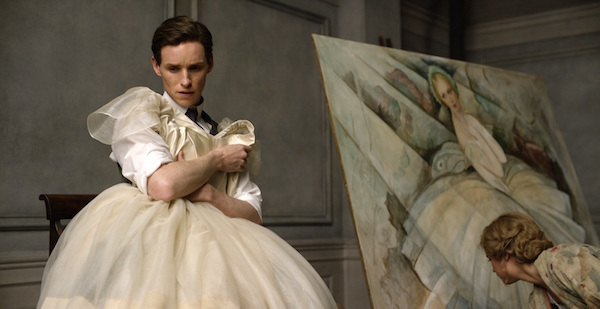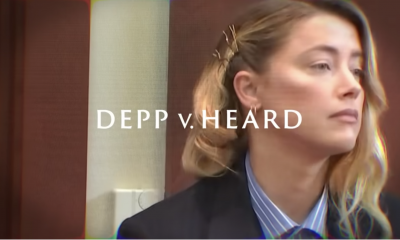Arts & Entertainment
‘Danish Girl’ masterfully realized
Trans-themed biopic is A-lister Oscar bait

It all starts out in one seemingly ordinary moment.
Prima ballerina Ulla is once again late for a sitting with portraitist Gerda Wegener (Alicia Vikander). Frustrated, Gerda asks her husband, famous landscape artist Einar (Eddie Redmayne), to sit in for their friend since she’s only working on the delicately extended foot. It opens today (Friday, Dec. 11) in the D.C. area.
Einar puts on the stockings, crams his feet into the slippers and holds the dress against himself as Gerda picks up her brushes and starts to paint. Einar slowly begins to caress the fabric as long-suppressed thoughts and emotions begin to emerge. Thus begins a remarkable journey for a devoted couple and a remarkable collaboration for a talented cinematic team.
Based on the largely forgotten true story of transgender pioneer Lili Elbe, one of the first people to undergo gender-reassignment surgery, “The Danish Girl” is an exceptional film. Director Tom Hooper (“The King’s Speech” and “Les Misérables”) coaxes powerful performances out of his top-notch cast and collaborates smoothly with his entire creative team.
The movie, set mainly in Copenhagen and Paris in the 1920 and 1930s, looks splendid. Working seamlessly with cinematographer Danny Cohen and production designer Eve Stewart, Hooper makes the most of place and period, contrasting the rigid lines of Copenhagen (and Einar’s harsh airless landscape paintings), with the color and light of Art Nouveau Paris which supports Gerda’s emergence as an artist and Lili’s emergence as a women.
The script by Lucinda Coxon, based on the novel by David Ebershoff, is supple and sensitive, as eloquent when the actors are silent as when they are speaking. Several key sequences unfold wordlessly. Coxon does a marvelous job balancing contemporary sensitivities about gender with the realities of the time period. With incredible subtlety, she makes it clear that Lili is not gay man in drag or a straight man donning a costume, but a woman becoming her true self.
Redmayne’s performance is even more powerful than his Academy Award-winning portrayal of wheelchair-bound scientist Stephen Hawking, due in part to a stronger script and cast. With the support of movement choreographer Alexandra Reynolds, who also worked with him on “The Theory of Everything,” Redmayne has developed an amazingly detailed physical vocabulary that guides him from the rigid mask of masculinity that constricts Einar to the freer expression of femininity that allows Lili to flourish. Redmayne also displays an emotional vulnerability and transparency that makes Lili’s journey incredibly compelling.
Vikander’s performance as Gerda is equally stunning and multi-faceted. As the movie opens, Gerda is deeply in love with Einar, but is also somewhat jealous of his success. He has found artistic satisfaction and popular acclaim with his detailed landscapes; she is frustrated with her attempts at conventional portraiture. When she convinces Einar to pose for her dressed as a woman, it starts as a game, but it quickly turns more serious. She finds a life-long muse, but ultimately loses a husband. With her cigarette holder clenched tight, sometimes in concentration, sometimes in frustration, sometimes in flirtation, Vikander (“Ex Machina”) brings a fascinating character to incandescent light.
The supporting cast is also excellent. Amber Heard (“Magic Mike XXL”) is a delightful find in the surprisingly pivotal of Ulla. The hard-working but fun-loving ballerina serves as a godmother of sorts to the emergent Lili. Her character helps to establish the strong bond between Einar and Gerda, but she is also the first to recognize Lili in public and recommends the clinic where Lili can finally find supportive care. Heard’s light-hearted performance brings a welcome humor and humanity to the proceedings.
Matthias Schoenaerts (“Far From the Madding Crowd”) is sleek and dapper as Parisian art dealer Hans Axgil, a childhood friend of Einar’s who helps Lili and Gerda through their transitions. Out actor Ben Whishaw (“Spectre,” “Suffragette,” “In the Heart of the Sea”) is engaging as a gay bohemian who initially misunderstands Lili’s intentions, but then becomes a supportive friend and guide. Adrian Schiller is charming as the windy but well-connected art dealer Rasmussen and Sebastian Koch is warm and wise as the doctor who finally comes to Lili’s rescue.
“The Danish Girl” may well be the finest LGBT release of 2015, although the year it is not over yet. It is definitely already in contention for well-deserved recognition in the 2016 awards races. Director Tom Hooper and a talented cast and crew have cast a powerful light on a little-known piece of LGBT history, and their moving and beautiful movie makes us reflect on how we are still learning about the mysteries of the human spirit.

The Rainbow History Project will host “Pickets, Protests and Parade Exhibit Tour” at 7 p.m. at Freedom Plaza. This event honors the courage, resilience and resistance of D.C.’s gay community. For more details, visit Eventbrite.
Go Gay DC will host “LGBTQ Community Social” at 7 p.m. at Hyatt Centric Arlington (1325 Wilson Blvd.). This fun event is ideal for meeting new people and community building. Attendance is free and more details are available on Eventbrite.
Xavier Entertainment DC will host “Cowboy Carter Afterparty” at 10 p.m. at Nellie’s Sports Bar. There will be fireworks, parades, and patriotic fun. For more details, visit Eventbrite.
Mezcal Amaras will host “Sha Boing Boing Showdown” at 6 p.m. at Snappy’s Small Bar (3917 Georgia Ave., N.W.). Get ready to test your hotdog eating abilities. Tickets start at $12.51 and can be purchased on Eventbrite.
Illusions Drag Queen Show will host “Drag Queen Dinner Show” at 7 p.m. at 2323 18th St. N.W. Guests will be treated to the very best celebrity drag impersonations in entertainment. Tickets start at $12.97 and are available on Eventbrite.
Thurst Lounge will host “A Thirsty Cowboy Afterparty” at 5 p.m. DJ Apollo will be performing. For more details, visit Thurst’s website.
9:30 Club will host “Gimme Gimme Disco: A Dance Party Inspired by ABBA” at 9 p.m. The DJ will play plenty of disco hits from the 70s and 80s. Tickets cost $45.30 and can be purchased on Ticketmaster.
a&e features
Doug Spearman takes his chance
‘Noah’s Arc: The Movie’ debuted on Paramount+ last month

There’s no question that when Patrik-Ian Polk’s series “Noah’s Arc” premiered on Logo 20 years ago, it was a groundbreaking creation. The story of a group of Black gay men and their wonderful friendship. The titular arc was that of the cute main character, Noah (Darryl Stephens), and his close-knit circle of friends, including Chance played by gay actor Doug Spearman. This compelling and loving fraternity may, in fact, be what brought viewers back repeatedly, including a 2008 movie, “Noah’s Arc: Jumping the Broom,” as well as the 2020 “Noah’s Arc” short, and now, a new full-length feature “Noah’s Arc: The Movie,” debuting on Paramount+ on June 20. In the movie, filled with equal measures of laughs and tears, Chance, who has faced a devastating loss, finds his dependable friends there, ready to support and comfort him at a moment’s notice. I had the pleasure of speaking with Spearman the morning of the streaming premiere of “Noah’s Arc: The Movie.”
WASHINGTON BLADE: Doug, since the early 2000s, when the “Noah’s Arc” series premiered on Logo, you have been playing the character of Chance, including in the latest installment, “Noah’s Arc: The Movie.” What was it about Chance that appealed to you as an actor?
SPEARMAN: When Patrik (-Ian Polk) called me to ask me to play him (Chance), I was at JFK airport in the baggage claim, waiting for a suitcase. He explained what the part was. The thing that stuck out to me was the fact that Chance was in a long-term relationship with another Black man. And, they had a child; they had a 4-year-old daughter named Kenya. I had never seen two Black gay men raise a child on TV before. I thought it was the most revolutionary thing I’d ever seen. I immediately thought I’ve got to do this because that was something nobody had seen. I thought it was incredibly important to take the part.
BLADE: “Noah’s Arc: The Movie” was, once again, written and directed by Patrik-Ian Polk, who you just mentioned, is the creator of the entire franchise. What’s the secret to your long-standing working relationship?
SPEARMAN: [Laughs] the whole team, all of us, are like a band of brothers. We fight like brothers, we come together like brothers, we hash things out, we talk, because we’re all very different from our characters. I think the challenge of playing these guys and then uplifting these men, playing a part, especially something written by Patrik, is like solving a math equation. There’s always a challenge that’s enjoyable for me as an actor: to try to find out what it is that Patrik wants, and then how do I do it.
BLADE: I think you do a very good job of it.
SPEARMAN: Thank you very much
BLADE: In the years between “Jumping the Broom” and the new full-length movie, many changes have occurred, and the story addresses some of them, including gay widowhood, which is something that the aging community is now confronting, as well as mental health issues. Please say a few words about how you approached those subjects in the new movie.
SPEARMAN: I had a lot of loss in my life, right before we started shooting. Two months before we started shooting the first series, my mother died. I was going through the grief process through that whole first season. Since then, I’ve lost a lot of people in my life. In fact, when we started shooting the second season, the second week we were shooting, my ex died of a heart attack. I was having to fold that into what I was doing with my life on the set and off the set. You’ve got to show up and you’ve got to do your work. The first two seasons of “Noah’s Arc” are always tinged with the memory of grief. So, when I had to deal with the death that Chance faces (in the new movie), which is a significant death in his life, it wasn’t that hard to reach back, especially the scene in the graveyard. It was something that I unfortunately could pull from personal experience.
BLADE: Shifting gears, the movie features delightful cast surprises, including Jasmine Guy and TS Madison. Did you have a chance to interact with either or both when they were on set?
SPEARMAN: No, I didn’t have any scenes with Jasmine, and I missed her. I wish I had gotten to see her because I actually got to direct Jasmine for a CBS promo shoot for “Queen,” back in the early ‘90s. I had a huge crush on her when she was on “A Different World.” So, I really would have liked to reconnect. But TS and I got to see each other every day because I was in all her scenes. It was extraordinary being around somebody like that. That is one outspoken woman!
BLADE: Even though Beyoncé never makes an appearance in the movie, there’s a lot of talk about her. Would you say you are a Beyoncé fan?
SPEARMAN: Yes! I’m breathing! Yes, I’m a Beyoncé fan. I actually got the chance to meet her. I knew her mom. Her mom was extraordinary to me. She is in the second movie I directed. She also gave us a wedding gown to use in the very first scene of the movie. That family is extraordinarily important to me. Not only just to be a fan, but to be somebody who’s gotten to know them and work with them and see how hard they work. I don’t think anybody works as hard as Tina or Beyoncé.
BLADE: There was a recent news item about gay actor Benito Skinner of the Amazon Prime series “Overcompensating” being told not to bother auditioning for straight roles. As an out actor yourself, how important do you think it is for queer characters to be portrayed by queer actors, and vice versa?
SPEARMAN: Being queer is a multifaceted identity. There’s no one kind of queer person. I think finding the best actor that’s your first circle of casting. I think one of the joys about being an actor is that you get to play different parts. I play straight guys all the time. Dads and husbands and things like that. I think a lot of people are told not to do it. In fact, I wouldn’t be Chance if the actor who was originally cast as Chance hadn’t been pulled out of the series by his agents because they didn’t want him to play a gay character.
BLADE: That’s amazing! Thank you for sharing that. Without giving away too much, the ending of the movie is a little ambiguous, even ending with a question mark. If there was a “Noah’s Arc: The Movie” sequel, would you come back for that?
SPEARMAN: Yeah! A lot of it would depend on what Chance’s journey is going to be like. Patrik and I have conversations like that all the time. He’s very interested and supportive of input. I hope I would be, as we all would be, part of the creative growth with these characters. They live in Patrik’s head, and he writes them, but we’re the ones who have to flesh them out. It’s a conversation, it’s always a conversation.
BLADE: You are currently performing in Molière’s “The Imaginary Invalid” as part of the New Orleans Shakespeare Festival at Tulane. What has this experience been like for you?
SPEARMAN: It’s extraordinary! I started on stage when I was seven. There’s nothing like working with a live audience and having that immediacy. I’m working with an extraordinarily talented cast in a really great play, and I have some of the best scene partners I could ever want.
BLADE: Are there any upcoming film or TV projects you’d like to mention?
SPEARMAN: I’m still a writer, and I’m still a director, and I’ve still got scripts that I would like to make. I have a little something that’s a cross between “Treme” and “Bridgerton” that I want to do. I’m always trying to figure out what the next thing is.
Photos
PHOTOS: Montgomery County Pride in the Plaza
LGBTQ celebration held in downtown Silver Spring

Montgomery County Pride in the Plaza was held on Sunday, June 29 at Veterans Plaza in Silver Spring, Md.
(Washington Blade photos by Michael Key)










































